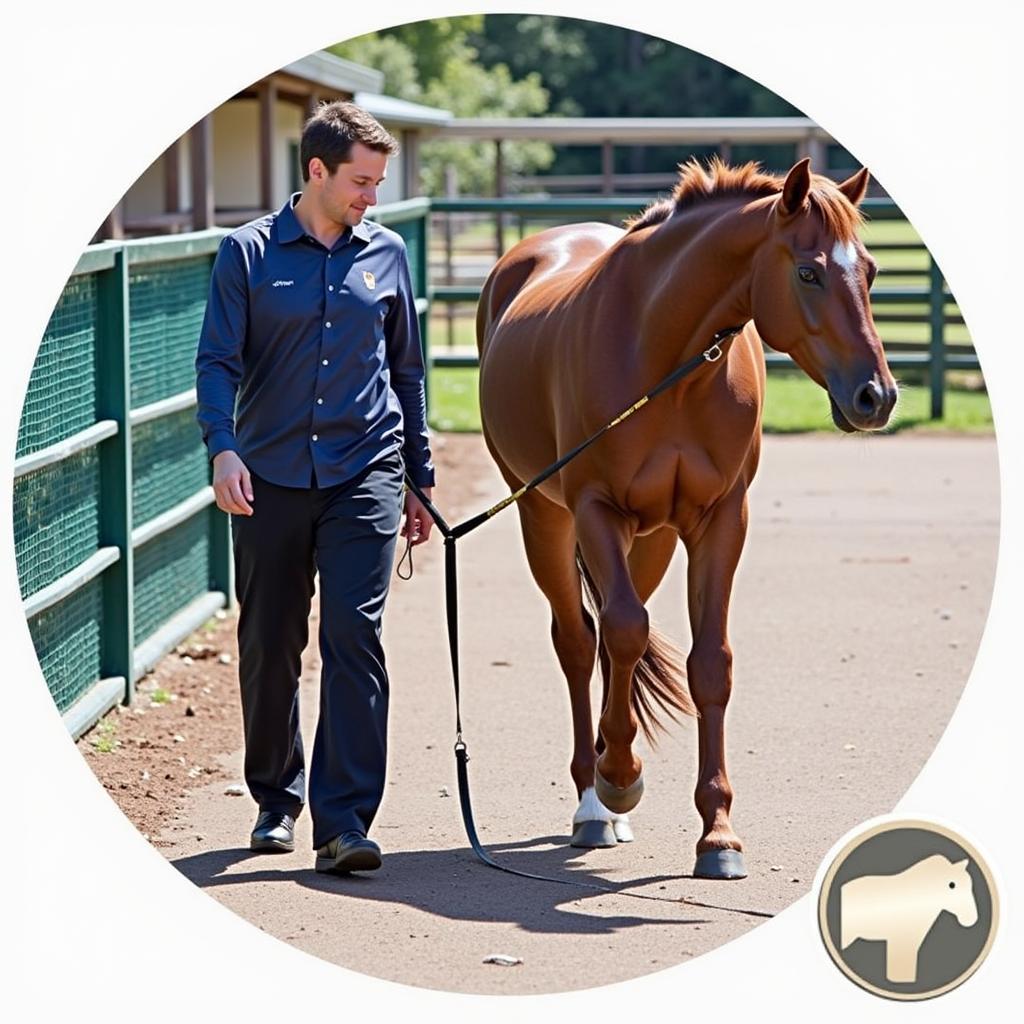Horse Tendon Damage is a serious concern for any horse owner. It can range from minor strains to severe ruptures, impacting a horse’s performance and overall well-being. Recognizing the signs, understanding the causes, and knowing the treatment options are crucial for effective management and recovery.
Identifying Horse Tendon Damage: Key Signs and Symptoms
Several indicators can point towards potential tendon damage in your horse. Lameness, particularly after exercise, is a common sign. You might notice swelling, heat, and pain in the affected area. The horse might be reluctant to move or bear weight on the injured leg. Pay close attention to any changes in your horse’s gait or behavior. Early detection is essential for minimizing the long-term impact of the injury.
Understanding the different types of tendon injuries is also important. There are three main classifications: strains, tears, and ruptures. A strain is a mild stretching or tearing of the tendon fibers. A tear involves more significant damage to the tendon, while a rupture is a complete tear of the tendon. Each type requires different treatment approaches and recovery times.
Common Causes of Horse Tendon Damage
Overexertion is a frequent culprit, especially during intense training or competition. Poor footing or uneven terrain can also increase the risk of tendon injuries. Improper shoeing can contribute to imbalances and strain on the tendons. Pre-existing conditions, such as arthritis or previous injuries, can make a horse more susceptible to tendon problems. Even something as seemingly simple as a stumble or fall can cause significant tendon damage.
What are the Treatment Options for Horse Tendon Damage?
Treatment for horse tendon damage varies depending on the severity of the injury. Conservative treatments, such as rest, ice, compression, and medications, are often used for mild strains. More severe injuries may require surgery or other advanced therapies. cloud boots for horses can also provide support and cushioning to the injured tendon.
“Early intervention is key when dealing with tendon injuries,” says Dr. Emily Carter, DVM, a leading equine sports medicine specialist. “The sooner you address the problem, the better the chances of a full recovery.” This highlights the importance of prompt veterinary attention for any suspected tendon issues.
Rehabilitation and Recovery from Horse Tendon Damage
Rehabilitation is a critical component of the healing process. Controlled exercise, physiotherapy, and other therapies can help the tendon heal properly and regain strength. The recovery period can be lengthy, often taking several months or even a year. Patience and consistent care are crucial during this time. horse fly wraps can be helpful in protecting the injured area during rehabilitation.
 Horse Undergoing Rehabilitation for Tendon Damage
Horse Undergoing Rehabilitation for Tendon Damage
How Can I Prevent Horse Tendon Damage?
Prevention is always better than cure. Proper conditioning, warm-up and cool-down routines, and attention to footing can significantly reduce the risk of tendon injuries. Maintaining a healthy weight and ensuring proper hoof care are also important preventative measures. “Regular veterinary checkups can help identify potential problems early on,” adds Dr. Carter, emphasizing the importance of proactive care. For certain activities, consider protective gear like horse jumping boots.
Conclusion
Horse tendon damage is a serious condition that requires prompt diagnosis and appropriate treatment. By understanding the causes, symptoms, and treatment options, you can help your horse recover and return to optimal health. Remember that early intervention and consistent care are essential for a successful outcome. Addressing horse tendon damage effectively is crucial for maintaining your horse’s well-being and performance.
FAQ
- What are the most common signs of tendon damage in horses?
- How long does it take for a horse to recover from a tendon injury?
- What are the different treatment options available for tendon damage?
- How can I prevent tendon injuries in my horse?
- What is the prognosis for a horse with tendon damage?
- What are the long-term implications of tendon damage?
- When should I call a veterinarian if I suspect my horse has a tendon injury?
For further information on related leg injuries, check out our articles on horse limping front leg no swelling and horse pastern injury treatment.
Need support? Contact us 24/7: Phone: 0772127271, Email: [email protected] or visit us at QGM2+WX2, Vị Trung, Vị Thuỷ, Hậu Giang, Việt Nam.